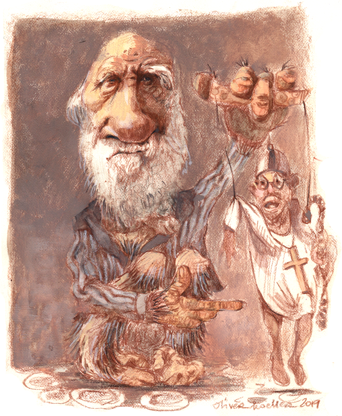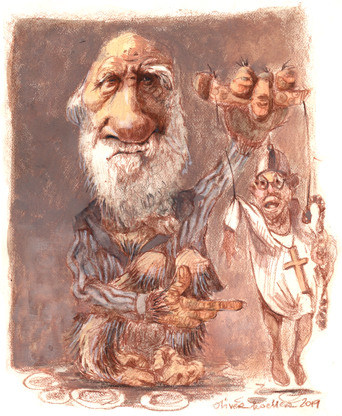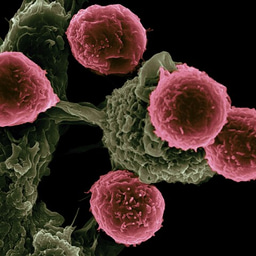

The scientific community needs moral standards if it is to continue its growth.
Perhaps because science is popularly imagined as being led by grey-haired elders in white coats, it’s easy to forget how young a profession it actually is. We’ve gone from the era of lone practitioners, to that of corresponding authors, to the advent of learned societies (beginning with the Royal Society back in 1660), to a global endeavour. And inevitably, its membership has swelled at each step, with its active population increasing from dozens to thousands if not millions today.
As such, what we see with the world of science is the evolution of a community from a small tribe of founders to a complex and interlinked society. Peculiarly complex in many ways, given that (like organised religions) it exists both within and in some ways parallel to the nation states which host its practitioners and count them as citizens or taxpayers.
Complex societies tend to go hand in hand with organised religions, with the latter providing a moral framework in order to quell the “free rider” problem inherent in any social grouping that exceeds a particular size. This “moralising gods” hypothesis posits that the existence of a supernatural agent facilitates cooperation between in-group strangers, with the god displeased by or punishing moral transgressions committed in interactions between the group’s members.
All human societies have religions of some description, but not all religions have moralising gods – and the association between moralising gods and societal complexity is a strong and verifiable one. However, it has remained an open question as to whether complex societies precede moralising gods, or the adoption of moralising gods primes a growing society for further complexity.
A 2019 paper from Whitehouse, Francois, Savage et al., (updated in 2021), now offers data in firm support of the former model: complex societies precede moralising gods. Analysing records from 414 human societies covering 10,000 years of history and 30 different regions of the globe showed that moralising gods generally appeared only after the development of megasocieties consisting of around one million members, with literacy potentially being a key catalyst.
Taking their conclusions at face value, and noting again the swelling population of scientists around the world, this begs the question of if and when the scientific community will evolve its own moralising gods. To be clear, this is not some facile question of whether science will become a new religion. Rather, as the global and interconnected scientific community approaches megasociety status, how will it ensure reciprocity, fairness, and in-group solidarity? This is a particularly thorny question given that morality itself is culturally relative to some extent, and scientists – by virtue of their global status – an extremely culturally diverse bunch that represent most of the nations on Earth.
Science can currently be regarded as a functioning anarchy, with its various scattered and decentralised clusters operating with nearly full autonomy. Funding agencies impose certain standards of professional and moral conduct, but they operate primarily at a national or – like the ERC – at a supranational level. Very few funding agencies exist (the Bill & Melinda Gates Foundation being one example) that fund at a global level. Consequently, funders’ oversight extends only as far as their awardees, which will usually be fairly constrained geographically.
Publications represent the true global currency of research, and it is currently at publication level that scientific morality is most obviously asserted – insistence on reproducibility, originality, rigour, and creativity. But those standards are widely flouted (exemplified most egregiously by predatory open-access journals), with the Reproducibility Crisis perhaps just the most visible aspect of internal corruption. The transgression of those standards, and the very public hand-wringing but often ineffectual countermeasures that increasingly accompany it are symptomatic of a society in the throes of a moral quandary. How should science police itself?
Also, while there is fairly broad agreement about how best to practice the scientific method (though, just as with religion, practice often falls short of the ideal, meaning many scientists are scientific sinners), there is almost no agreement about what constitutes a good scientist (again, a reflection perhaps of the fact that scientists are drawn from all cultures). What does it mean to be a scientist? Are there scientists? Or do they represent a reverse of Gombrich’s axiom that “There really is no such thing as Art. There are only artists”; is there actually no such thing as a scientist, there is only Science? Would it even be possible to agree on what a scientist is, let alone encourage adherence to that ideal and its explicit morality?
All these questions and quandaries probably demonstrates that science is already approaching a situation where moralising gods are required. The consistent unreliability of universities when probing accusations of misconduct directed at their faculty – especially relating to sexual harassment and bullying – is a further cue. Science, as a global community, needs to establish and communicate what its mandatory standards of personal and professional behaviour are. And there needs to be a way of assessing and judging offenders, ideally in a way that prevents them simply relocating and resuming their activities elsewhere.
If we don’t develop moralising gods then the evolution of Science as a human activity is likely to stall at the current quasi-national state. Conversely, the development of moralising gods should – in theory – ensure greater cohesion and potentially catalyse the establishment of a true global society of scientists. So what form should those gods take? Artificial intelligences? We already trust algorithms to detect plagiarism in text and manipulation in images, so machine learning is arguably already permeating evaluation of scientific conduct.
That might sound repellent, or raise the image of a society of tech priests genuflecting to their machine gods, but it’s perhaps worth reflecting at this point on Iain M. Banks’ masterful “Culture” series of science fiction novels. The running of the Culture is overseen by Minds, AIs of unimaginable complexity but a distinctly biological playfulness. Asked if the Culture’s Minds were a secular depiction of what gods would actually be like, Banks’ response was emphatic:
“If we’re lucky.”
Originally published on Total Internal Reflection – here.





Join the FEBS Network today
Joining the FEBS Network’s molecular life sciences community enables you to access special content on the site, present your profile, 'follow' contributors, 'comment' on and 'like' content, post your own content, and set up a tailored email digest for updates.